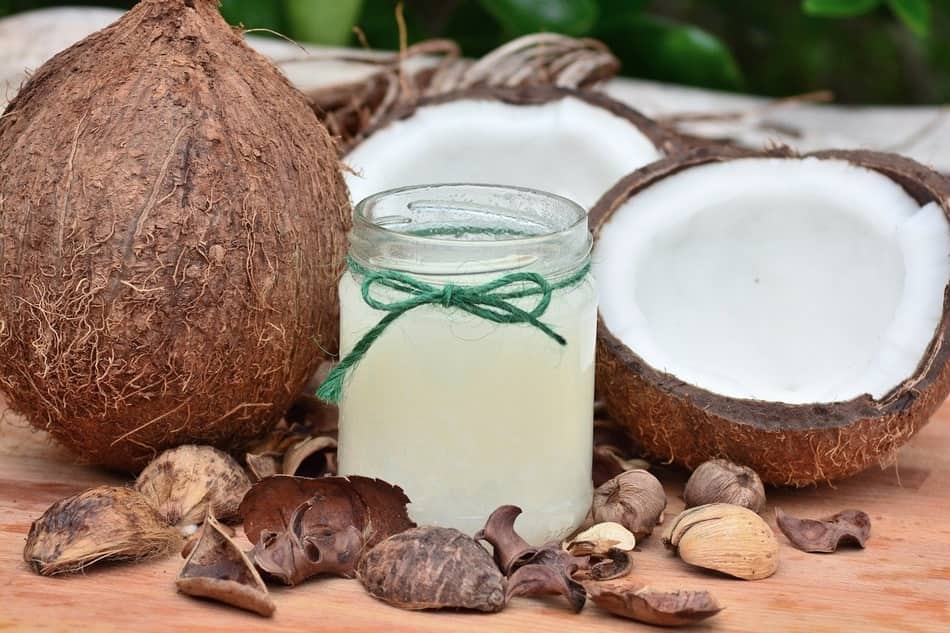Skincare nuts and DIY gurus have come up with an endless number of ways coconut oil can be used but can you use coconut oil on Faux leather?
In this article, I did research on whether this highly versatile household item can be used to treat faux leather and I’m ready to share with you all I have found.
So can you use coconut oil on faux leather? Faux leather is a highly nonporous material so before you apply coconut oil on it you would want to warm the coconut oil first and use a soft clean cloth to apply it over the surface of the faux leather item.
The faux leather has no pores on its surface so when you apply coconut oil on it it’s not going to soak in. So warming the coconut oil is before applying it will allow the coconut oil to melt to a much finer consistency so that you only get a very thin layer.
For the remaining parts of this article, I’m going to show you some of the best ways to apply coconut oil on your faux leather items and also outline the advantages and disadvantages of applying coconut oil to faux leather. Keep reading this article to find out more!
Pros And Cons Of Using Coconut Oil On Faux Leather
There is a huge debate over the use of coconut oil on leather. While one group of people say using coconut oil has had a negative effect on their goods others have had a lot of good reports about its use.
Whatever the case is, I’m going to share with you the positives as well as the negative effects of using coconut oil on faux leather goods.
The Pros
1. Coconut Oil Is Very Easy To Find
Coconut oil is a common household item that you can easily find around most homes. If you don’t have one sitting on your shelves, your neighbor will definitely have it.
2. Coconut Oil Is Hypoallergenic
A lot of us today are allergic to so many different things and because of this, we tend to be very careful with the various cleaning and conditioning products we get for everything around us from the furniture we rest on to car seats, bags, wallets, and everything in-between.
One thing you will, however, notice when especially when it comes to leather care products is that a lot of these product manufacturers go at all lengths to keep their ingredients secret. This is because some of these ingredients are longstanding family recipes and they wouldn’t want anyone stealing their ideas.
With this, you can never be too safe or too careful when it comes to buying leather care products.
So using coconut oil is going to be a safe bet for use on faux leather – as it’s hypoallergenic with very few allergic reactions than other chemical-based products.
3. Coconut Oil Is Good For Conditioning Faux Leather
Although there are specially formulated leather conditioners for faux leather, you will be able to give your faux leather goods very fairly good conditioning that will not destroy the quality of your faux leather goods.
4. Coconut Oil Will Repel Moisture From Your Faux Leather
Faux leather will usually come in two finishes; vinyl or polyurethane. These tend to make faux leather water-resistant.
Because of coconut oil’s moisture repelling quality, applying coconut oil on your faux leather goods is going to be a serious boost to its water resistance.
If you want the waterproofing you get with your coconut oil to last even longer, there are a couple of things you will want to add to the coconut oil.
This will involve adding 1/4 cup of beeswax and 1/2 tablespoon of carnauba wax to 1/8 cup of coconut oil. This is going to help give your leather items a long-lasting waterproofing.
5. Coconut Oil Will Put A Nice Shine On Your Faux Leather Items
Using coconut oil on faux leather goods will help to keep the leather looking fresh and new. This is because the rich oils in coconut oil will help put a nice clean shine on your leather items.
Using coconut oil is particularly beneficial if you simply want to keep your faux leather goods looking moisturized with a nice protective shine.
The Cons
1. Temperature Can Affect How Coconut Oil Works On Faux Leather
One of the biggest issues when it comes to applying coconut oil on faux leather is that extreme cold can freeze the coconut oil applied on the faux leather.
While this may not happen if you live in a place where the temperature is usually hot, coconut oil will freeze and this is going to happen very fast and will leave a white residue on the surface of the leather.
So if you live in a country where it can get very cold then you might want to pay special attention as far as using coconut oil on your faux leather goods go.
The good news is there’s some sort of way around applying coconut oil that’s very effective if you live in a place with colder temperatures.
You could either warm up the coconut oil, apply a very thin layer of it, then thoroughly buffing off any form of coconut oil residue, and then allowing the oiled faux leather item to thoroughly dry before use.
Or you can apply the coconut oil to the faux leather item and then put the oiled item close to a heat source so the oil melts further. After this, you would want to buff and dry the faux leather item before using it.
2. Not Everyone Is A Fan Of Coconut Oil’s Smell
Coconut oil will generally come in two forms that is unrefined or virgin coconut oil and refined coconut oil.
The difference is that the unrefined or virgin coconut oil is obtained from the fresh coconut fruit and it doesn’t involve the use of any high temperatures.
Because of how the virgin coconut oil is processed (“cold-pressed”) it actually smells like coconuts and not everyone appreciates this smell.
If you’re one of those people who simply cannot stand the smell of coconut oil or you find yourself not liking the smell of coconut oil let alone putting it on your leather goods, then you might want to consider refined coconut oil.
The refined coconut oils as the name implies are just the opposite of the unrefined coconut oil. Refined coconut oil comes from dried coconuts.
Unlike the unrefined coconut oil, the refined coconut oil is taken under high temperatures and then goes through a bleaching and deodorizing process that gives it a nice neutral smell.
Although the unrefined or virgin coconut oil will maintain a high level of its nutritional value, it may not offer you the very best smell.
Related Article: Why Does Leather Smell So Good?
How To Apply Coconut Oil On Faux Leather
After taking a look at the pros and cons, do you feel convinced using coconut oil on faux leather is the way to go?
If you do, here’s a step-by-step guide on how to apply coconut oil on faux leather so that the application maximizes the benefits while minimizing its negative effects on your faux leather.
Things Needed:
- Coconut Oil
- Faux Leather Cleaner or Dish Soap and Water
- 2-4 Soft Clean Cloths
Procedure:
Step 1: Make sure to carefully clean your faux leather item first with a good faux leather cleaner. Or if you’re like me and would prefer a home DIY cleaner for your faux leather, you can use a solution of dish soap or any mild detergent and water.
Mix a solution of one tablespoon dish soap with several cups of clean ordinary water.
Step 2: Put your soft clean cloth into the solution and wring it out thoroughly until there’s no water dripping.
Step 3: Gently clean the surface of your faux leather item by wiping it down.
Step 4: Once the entire surface of the leather is thoroughly cleaned, you can now use your second soft clean cloth to dry wipe the surface.
Step 5: Leave the leather item to air dry
Step 6: Warm 1-3 teaspoons (depending on how big the item you’re oiling is) of coconut oil and then load it on your soft clean cloth.
Step 7: Rub the oiled cloth gently over your faux leather item.
Step 8: Buff the surface of the leather with a dry soft clean cloth.
Step 9: Leave to air dry in a cool dry place. Viola!

